22 Extraordinary Education Innovators
In scattered urban and rural habitats across the country, committed educationists in private education and voluntary organisations are ideating pedagogy and process innovations which could revive India’s moribund education system, and enable the nation to reap its much-trumpeted demographic dividend: Summiya Yasmeen
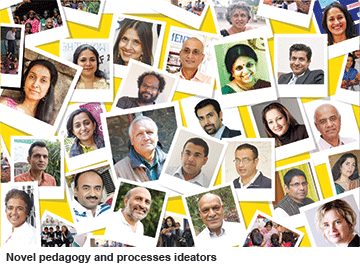 The reality that contemporary India’s early childhood, primary, secondary and higher education institutions are completely unprepared to meet the rigours and challenges of the 21st century seems to be apparent to all right-thinking citizens, except politicians in Parliament and the state legislative assemblies.
The reality that contemporary India’s early childhood, primary, secondary and higher education institutions are completely unprepared to meet the rigours and challenges of the 21st century seems to be apparent to all right-thinking citizens, except politicians in Parliament and the state legislative assemblies.
The authoritative Annual Status of Education Report 2014 published in January, indicates that over 50 percent of class V children in government rural primaries can’t read class II texts or do simple subtraction and division sums. Three years ago, 15-year-olds from India finished an embarrassing second last among student contingents who wrote PISA (Programme for International Student Assessment) after which India withdrew from PISA. A Young Citizen National Survey 2015 reveals shocking ignorance and regressive mind-sets of class IX students and first year undergraduates countrywide. A 2013 report of the Delhi-based NGO Aspiring Minds says that only 47 percent of Indian graduates are employable in professionally-managed corporates. Yet despite the lamentable condition of Indian education, in the Union Budget 2015-16 the Central government has reduced its outlay for education, in the fanciful hope that state governments will fill the breach (see special report p.74).
But wait, all is not lost. In scattered urban and rural habitats across the country, committed educationists in private education and the voluntary (NGO) sectors are ideating novel pedagogy and process innovations which if replicated en masse, could revive India’s moribund education system and enable it to reap its much-trumpeted demographic dividend.
“India has a long tradition of education innovation. In the 1920s, Gijubhai Badheka did pioneering but forgotten work in early childhood education. Likewise, Mahatma Gandhi suggested a buniyadi talim (basic education) syllabus/curriculum, and seer-visionaries Sri Aurobindo and J. Krishnamurti devised holistic, nature-friendly school education systems which are being practised to this day. This spirit of innovation in education has persisted though the Indian eco-system doesn’t encourage it.
More recently, innovations such as the activity-based learning lamentamodel in Tamil Nadu have been institutionalised at the policy level and scaled up. If the decline in Indian education — especially public education — is to be stemmed, it’s important for government and society to encourage, recognise and reward education innovators,” says Dr. Vijaya Sherry Chand, professor of the Ravi J. Matthai Centre for Educational Innovation (RJMCEI) at IIM-Ahmedabad.
Established in the heart of India’s premier B-school in 1992 to suggest ways and means to encourage institution building in higher education, during the past decade RJMCEI has expanded the ambit of its purview to include primary and secondary education. In pursuit of this objective, two years ago in partnership with the state governments of Maharashtra and Gujarat, RJMCEI promoted a Educational Innovations Bank (EIB) to classify and document innovations designed and implemented by elementary school teachers working in government schools in its two partner states. “With the support of the state governments, about 12,000 innovations of government primary teachers have been validated, and 100 each from Gujarat and Maharashtra have been identified for scaling up. We hope this project will inspire more classroom and pedagogy innovations to improve learning outcomes in primary-secondary education,” says Chand, an alumnus of IIM-Ahmedabad and Gujarat University, who adds that the project received the HP Sustainability & Social Innovation Award, 2012.
Dr. Tamo Chattopadhyay, former professor of education innovation and entrepreneurship at the University of Notre Dame, USA and currently a Kolkata-based education consultant, concurs. “India desperately needs innovation at all levels in education to improve learning standards and assessment systems, and in teacher training and advancement. The Central and state governments, society and parent communities need to alter their change-averse mind-sets and actively support education innovators,” says Chattopadhyay.
In the pages following, EducationWorld profiles 22 innovators who are re-arranging the goal posts of Indian education. However, please note the list is illustrative, not exhaustive. Readers deeply interested in education innovation should also read our cover story ‘Big bang initiatives slowly revolutionising Indian education’ (EW October 2014, www.educationworldonline.net archives).
Egalitarian education provider
In 2000, IIT-Roorkee and IIM-Ahmedabad alum Pankaj Jain launched a modest education programme for out-of-school children in the slums of Ahmedabad. Fifteen years on, the Gyan Shala project has grown to 1,550 learning centres covering 45,000 children in nine cities, and innovated a path-breaking low-cost, high-quality education delivery model. Promoted under the aegis of the Ahmedabad-based Education Support Organisation founded by Jain, who gained valuable work experience in ISRO, IRMA and Amul, Gyan Shala has been recognised by the UK-based Department for International Development as one of the world’s most cost-effective programmes meeting United Nations-mandated education quality goals.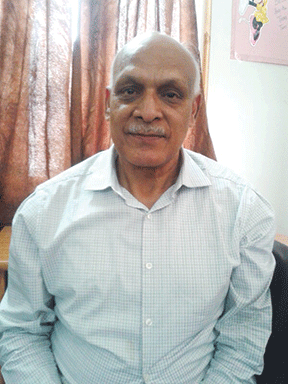
Gyan Shala’s major objectives. To provide free-of-charge high quality education on a par with recognised private urban schools to children from poor households. Gyan Shala classes are run in rented buildings in slum locations which we equip with furniture, lighting and learning materials. In our model the class teacher is enabled by a four-tier academic support team and teaching is activity-based, through worksheets and group learning aids. Moreover, we provide continuous teacher training and have institutionalised methods of accountability and independent performance assessment systems. Our cost per child is Rs.3,000 per year compared to Rs.6,000 spent in government schools.
Impact assessment. Currently, we conduct classes for 45,000 children in Ahmedabad, Surat, Patna, Bihar Sharif, Muzaffarpur, Kolkata, Kanpur, Lucknow, and Farrukhabad. A recent survey of Educational Initiatives Pvt. Ltd reveals that the learning outcomes of Gyan Shala students are 100 percent higher than of children in government schools, and on a par with elite CBSE schools.
Future plans. To partner with government schools under the PPP model and start a chain of affordably priced schools for low-income groups.
Master storyteller
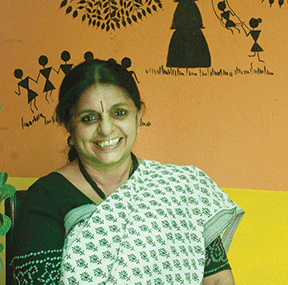 Geeta Ramanujam is founder-director of the Bangalore-based Kathalaya Trust and the Academy of Storytelling. An economics, education and library science alumna of Madras University with over two decades of classroom experience in some of the country’s top-ranked schools (Aurobindo Memorial, The Valley School, Bangalore), Ramanujam promoted Kathalaya in 1998 to enable teachers and students to teach and learn better through the ancient art of storytelling. Subsequently in 2006, she launched the country’s first Academy of Storytelling which offers certificate and diploma programmes in this novel pedagogy.
Geeta Ramanujam is founder-director of the Bangalore-based Kathalaya Trust and the Academy of Storytelling. An economics, education and library science alumna of Madras University with over two decades of classroom experience in some of the country’s top-ranked schools (Aurobindo Memorial, The Valley School, Bangalore), Ramanujam promoted Kathalaya in 1998 to enable teachers and students to teach and learn better through the ancient art of storytelling. Subsequently in 2006, she launched the country’s first Academy of Storytelling which offers certificate and diploma programmes in this novel pedagogy.
What’s the history and inspiration behind Kathalaya?
During my two decades-plus career as a teacher, I became increasingly aware that teaching was in need of urgent reform. Within a regimented and monotonous school system, students were engaged in ritual, not real learning. Having grown up listening to stories, I decided to experiment with storytelling as a teaching technique to spark creativity and the spirit of inquiry within children.
The outcome of the Kathalaya experiment.
As a pilot project in 1998, we signed up with five schools, including a school for the hearing impaired, a rural school and a Montessori centre for introducing weekly storytelling classes and got amazing results. Since then, Kathalaya has trained over 12,470 teachers in 525 schools countrywide in the art of storytelling using voice narration, story reading, picture stories, toy theatre, clay modelling, puppetry, shadow play, role play and craft activities. Stories and folklore are rich education tools which can significantly enhance curriculums, and dramatically improve students’ retention and learning outcomes.
With rising demand for our teacher training workshops, in 2006 I promoted the Academy of Storytelling, affiliated with the Scottish Storytelling Center, Edinburgh, International Institute of Storytelling, Tennessee, USA and the University of Skowda, Sweden to offer diploma courses.
Reach and impact.
Kathalaya has conducted storytelling sessions for over 500,000 children and has trained over 70,000 individuals. Today, most storytelling organisations in the country are run by our alumni.
Future plans.
Hopefully by 2018, I will realise my dream of setting up an international university of storytelling.
School choice champion
Dr. Parth Shah is president of the Delhi-based Centre for Civil Society (CCS, estb. 1999), the country’s top think tank for propagating liberal ideas and causes. An alumnus of Auburn University (USA) and former professor of economics at Michigan University, Shah has championed the cause of ‘unrecognised’ budget private schools sited in urban slums and villages which offer children from poor households an alternative to poor-quality government primary-secondary education.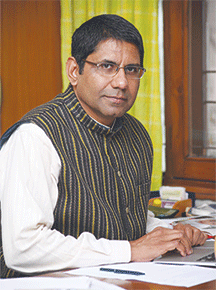
In 2007, CCS launched a first-of-its-kind School Choice Campaign (SCC) to provide government-funded school vouchers which enable children from socio-economically disadvantaged households to access private schools of their choice.
Factors which led to launch of the School Choice Campaign.
For several decades, Kerala has been celebrated as the most literate state of the Indian Union. When I researched this phenomenon, I discovered 60 percent of children in Kerala are in privately managed schools. The much admired education system of this allegedly communist state is hugely dependent on private education providers. The majority of schools in the state are government-aided, providing parents a choice between government and aided private schools. School choice is the secret of success of the Kerala education model.
CCS’ school vouchers programme.
If government schools don’t perform, parents should have the option to enrol their children in better-performing private schools through government-funded vouchers. To demonstrate the efficacy of vouchers, CCS successfully initiated two pilot projects in East Delhi funding 800 students.
The basic idea of the voucher model — that public money should fund children rather than schools — has been incorporated into the Right to Education Act, 2009. The 25 percent reservation for underprivileged children in private schools, with the government reimbursing the latter the cost of educating them, is in effect the voucher programme. If implemented efficiently countrywide, it could become the world’s largest school vouchers programme.
Budget private schools.
CCS’ current priority is our campaign to save India’s estimated 300,000 ‘unrecognised’ budget private schools established by education entrepreneurs. Across the country, several budget schools are being closed down by state governments for failing to meet the infrastructure/teacher-pupil norms specified by the RTE Act. The closure of these schools will deprive thousands of parents of school choice.
Gifted children’s champion
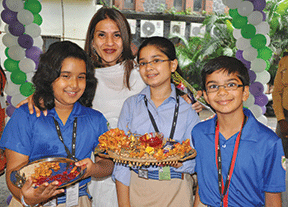 Fatima Agarkar is managing trustee of the Mumbai-based JBCN Education Group which owns and manages nine Children’s Nook preschools and three K-12 JBCN International schools with an aggregate enrolment of 2,300 students. An alumna of Mumbai and Birmingham universities, Agarkar served with Commerzbank, Times of India and Egon Zehnder International before co-founding JBCN Education with well-known educationist Pinky Dalal in 2000. Under Agarkar’s leadership, JBCN International schools have introduced a first-of-its-kind programme for gifted children.
Fatima Agarkar is managing trustee of the Mumbai-based JBCN Education Group which owns and manages nine Children’s Nook preschools and three K-12 JBCN International schools with an aggregate enrolment of 2,300 students. An alumna of Mumbai and Birmingham universities, Agarkar served with Commerzbank, Times of India and Egon Zehnder International before co-founding JBCN Education with well-known educationist Pinky Dalal in 2000. Under Agarkar’s leadership, JBCN International schools have introduced a first-of-its-kind programme for gifted children.
What is the motivation behind introducing the programme for gifted children?
At JBCN, we believe children should be assigned home-rooms, i.e classrooms based on age. But one of the consequences of this classification is that children may have differing IQs, learning speeds and capabilities. Exceptionally talented children can get lost in mixed-capability classrooms and need stimulation and challenge from their peers to attain their full potential. That’s why we devised the gifted children’s programme.
What are the features of the JBCN programme for gifted children?
Our academic team has designed programmes for gifted children starting from senior kindergarten, based on globally-benchmarked skills and capabilities. Under the 32-week programme, a senior teacher spends a couple of hours every week with each gifted learner during school hours, engaging her in challenging tasks to develop out-of-the-box thinking skills. Currently, we are implementing accelerated learning programmes for maths and English language. Next year we will add creative arts.
What’s the coverage of your gifted children’s programme?
In our three schools, the programme covers 150 gifted children.
Future plans.
We are currently exploring collaborations with schools in Japan, Germany and England to enable our gifted children to interact with their peers globally.
Learning-by-doing innovator
An alumna of the top-ranked National Institute of Design, Ahmedabad and promoter-director of the Riverside School (estb. 2001), Kiran Bir Sethi is the founder of Design For Change (DFC), a one-of-its-kind programme which encourages class III-X children to design and implement socio-economic development programmes in their school neighbourhoods. Since its launch in 2009, DFC has ignited the imagination and attracted participation of 1.35 million children in 200,000 schools in 30 countries, to initiate social impact programmes in civic infrastructure development, waste management, reafforestation, adult literacy, sanitation and health awareness which have positively impacted the lives of 22 million people worldwide.
What prompted you to launch Design For Change?
There’s too much focus in education on being the smartest, fastest and strongest. Success is measured more by academic outcomes rather than children’s well-being. As a result of this ‘either, or’ approach, our children are graduating with content, but no character and lacking passion and compassion.
The prime objective of DFC is to offer a ‘both, and’ approach to learning — a simple and effective way to educate both head and the heart. Through our FIDS — feel, imagine, do and share — formula, we prompt children to undertake socio-economic development programmes locally and simultaneously learn by doing.
The innovation.
The Design For Change initiative was founded on the powerful premise: ‘I CAN’. More specifically, children can. Children are an untapped resource for developing better, more liveable communities. The programme also creates the potential for leadership and citizenship in the youngest among us, around the world.
Reach and impact.
The DFC programme reaches out to 32,000 schools in India with 100,000 children annually.
Future plans.
We are actively looking to establish more institutional partners and work with state governments to expand DFC’s footprint in India, and are focusing on incorporating the design mindset in education. This year our 50-hour design thinking curriculum is being piloted in 60-plus schools countrywide.
Science learning enabler
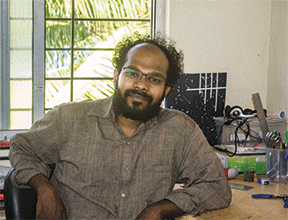 An engineering graduate of Nagpur University and former Teach For India Fellow, Lewitt Somarajan is chief executive of Pune-based Life-Lab (estb. 2013), an initiative of the GREAT (Global Research Education and Training) Foundation promoted by Dr. Viney Kirpal, former professor (humanities) at IIT-Mumbai. Life-Lab provides underprivileged schools activity-based, low-cost innovations to develop scientific and critical thinking skills among children. Within two years of commencing operations, Life-Lab has bagged Hewlett Packard’s Educational Innovation Fund for India Award and the Tata First Dot’14 Award.
An engineering graduate of Nagpur University and former Teach For India Fellow, Lewitt Somarajan is chief executive of Pune-based Life-Lab (estb. 2013), an initiative of the GREAT (Global Research Education and Training) Foundation promoted by Dr. Viney Kirpal, former professor (humanities) at IIT-Mumbai. Life-Lab provides underprivileged schools activity-based, low-cost innovations to develop scientific and critical thinking skills among children. Within two years of commencing operations, Life-Lab has bagged Hewlett Packard’s Educational Innovation Fund for India Award and the Tata First Dot’14 Award.
What is the history and inspiration behind the promotion of Life-Lab?
Our education system doesn’t encourage entrepreneurship. I made this discovery while studying engineering in Nagpur. In 2008, at the Tata Jagriti Yatra, an 18-day train journey undertaken by 400 selected youth, I met several social entrepreneurs who are doing amazing work in rural India. This was a turning point in my life. After graduation I worked with an education start-up followed by a two-year Teach for India Fellowship. The experience I acquired in education led to the promotion of Life-Lab.
What are the prime objectives of Life-Lab?
We conceptualise environments which encourage and enable learning of the sciences. We have designed a two-year programme during which we install low-cost science labs, provide DIY (do-it yourself) kits for students, conduct training programmes for science teachers, and establish science clubs in schools. To keep costs low, we use waste materials to build our labs. We also offer primary-secondary schools our STEAL (science, technology, engineering, arts and language) curriculum. We provide this entire package to government and aided schools free of charge, although we incur an expense of Rs.100 per student per month.
How satisfied are you with the impact of Life-Lab?
Fairly satisfied because the model is working. Our STEAL curriculum has been adopted in 27 schools in Maharashtra, Gujarat, Delhi-NCR and Karnataka with 18,000 children.
What are your future plans?
We are working on a plan to establish R&D (research and development) hubs to develop contextualised content for enriching and improving our STEAL curriculum.
Barefoot College legend
Sanjit (‘Bunker’) Roy is the much-acclaimed legendary promoter-director of the Social Work and Research Centre (SWRC), Tilonia (Rajasthan), popularly known as The Barefoot College (BC, estb. 1972).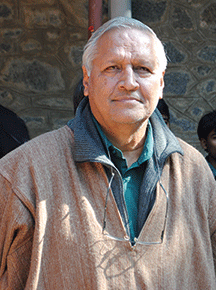
What is the history and motivating factors which prompted you to promote Barefoot College in this remote area?
I had a very privileged Doon School and St. Stephen’s education and was set to enter the civil service, when I visited Bihar during a great drought and famine in the mid-1960s. What I witnessed there prompted me to believe I could make a greater contribution to national development by working in rural India. Therefore, I signed up with Catholic Relief Services — a US-based NGO — which sent me to Ajmer to dig 500 irrigation wells in five years. During this period, I met Meghraj, a Jat well-driller who came from Tilonia and taught me everything about well drilling. He encouraged me to start a rural community college in Tilonia.
What are the prime objectives of SWRC/Barefoot College?
To tangibly improve the quality of life of people in village India, particularly the abject poor living on less than $1 per day by empowering them to bring light and water into their homes, and to build capacity and capability within their own communities to improve productivity and incomes.
The Barefoot College dispenses its own type of education.
The major infirmity of mainstream primary and secondary education is that it’s urban rather than village-centric, and alienates students from rural India, aka Bharat. Therefore the BC curriculum which combines primary and vocational education designed for village schools, is informal, connected with village life and situations, and is deliberately uncertified to retain our graduates in their native communities.
Barefoot College impact.
The Barefoot College has trained solar and rainwater harvesting master trainers and teachers who have spread out to 673 villages in eight states across the country. In all of them, the Millennium Development Goals — full productive employment and decent work for all; universal primary education; women’s empowerment and gender equality; reduction of child mortality and improved maternal health; environmental sustainability and halving the proportion of people with access to safe drinking water and sanitation and developing global partnerships for development — have been substantially attained.
Teach For India driver
Shaheen Mistri is founder-CEO of Teach For India (TFI), a high-potential initiative which offers outstanding college graduates and professionals the opportunity to teach full-time for two years in under-resourced, low-income schools, to end “inequity in education”. An alumna of Mumbai and Manchester universities who founded the Akanksha Foundation (estb.1991) to provide supplementary education to 5,000 underprivileged children in Mumbai and Pune, Mistri accepted an offer to spearhead Teach For India, modelled on the highly-successful Teach For America programme, in 2008.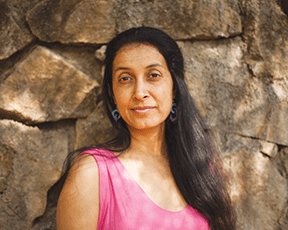
What is the motivation behind TFI?
Through TFI, we want to eliminate education inequity in India. Our belief is that every child is entitled to high quality education to develop and realise her potential.
Teach For India objectives and programme.
TFI is based on a two-part theory of change: the first is a teaching fellowship, a training ground for leadership and commitment. The second part is an alumni movement. We select brilliant graduates in the hope and expectation that after serving with TFI, they will rise to positions of power and authority in industry, government, business and will become missionaries and benefactors of education and child development.
The TFI Fellowship is a two-year full-time paid programme in which we place promising graduates and professionals as full-time teachers in low-income schools. All TFI fellows are paid a monthly stipend of Rs.17,500 plus a housing allowance.
The programme is rigorous, challenging and enables selected fellows to use their experiences to develop as leaders while transforming the lives of underprivileged children. Prior to commencement and during the programme, there’s ongoing teacher and leadership training.
Reach and impact.
TFI’s 900 fellows work in 264 schools with 23,000 children in six cities: Mumbai, Pune, Delhi, Hyderabad, Chennai and Ahmedabad. Moreover, 700 TFI alumni are working in a variety of for and not-for-profit organisations.
Future plans.
We are expanding into our seventh city, Bangalore, this June.
Curriculum enrichment educator
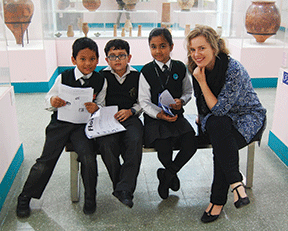 Eliza Hilton is co-promoter (with Katherine Rose) of the Delhi-based Flow India Education & Culture Consultants Pvt. Ltd (estb.2010), an education company which enriches primary-secondary school curriculums with experiential learning programmes. An alumna of Oxford University and the School of Oriental and African Studies, London, Hilton began her career as a secondary school teacher in England, served with the Aga Khan Foundation in Afghanistan and the UK for five years before moving to India in 2010 to start Flow India.
Eliza Hilton is co-promoter (with Katherine Rose) of the Delhi-based Flow India Education & Culture Consultants Pvt. Ltd (estb.2010), an education company which enriches primary-secondary school curriculums with experiential learning programmes. An alumna of Oxford University and the School of Oriental and African Studies, London, Hilton began her career as a secondary school teacher in England, served with the Aga Khan Foundation in Afghanistan and the UK for five years before moving to India in 2010 to start Flow India.
What is the inspiration behind Flow India?
We connect the education that children receive in classrooms with their history, culture, and environment. We believe such supplementary education improves their ability to think, question and interpret, thus preparing them for work and life in the 21st century.
Flow India programmes.
We offer three-day programmes for schools which include creative enquiry sessions, group activities, story-telling, role-play and visits to museums and heritage sites. Our one-year Flow integrated creative enquiry programme for schools is of greater depth and covers science, history, civics and arts education and prompts self-evaluation, creativity, expressive language and 21st century learning. We have a core team of seven, and around 45 freelance facilitators drawn from fields such as art, historical research, environment and the performing arts.
How satisfied are you with the impact of Flow India?
This is our third year in India. In our first year, we worked with only one school. Now we are working with more than 30 schools and approximately 15,000 children.
Future plans.
Flow India will continue to grow to become a trusted knowledge-transfer partner of progressive schools, transforming their teaching-learning programmes by providing curricula enriching supplementary education.
STIR change maker
An economics and management alumnus of Cambridge University, UK and INSEAD, France and Ashoka fellow who quit a decade long corporate career with Google, eBay and Booz & Co to transform into a social entrepreneur in 2007, London-based Sharath Jeevan launched STIR (Schools and Teachers Innovating for Results) Education in 2012. STIR’s prime objective is to build teacher networks in India and Uganda.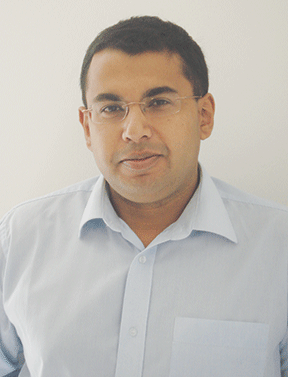
What are the inspiration and antecedents of STIR?
Although enrolments in primary education in India and emerging countries are impressive, children’s learning attainments are very poor. For this, teachers are widely faulted. STIR Education’s objective is to reignite the spark in teachers and start a teacher-led movement to improve learning outcomes.
We started in 2012 with a pilot in Delhi and interviewed over 3,000 teachers in 300 low-income schools across the capital. We were inspired to learn there were so many talented and committed teachers already within the system. STIR Education supports them to become a force for change in the system.
What is the modus operandi of STIR Education?
We first ask teachers to submit their micro-innovations — small-scale ideas of how they can improve learning in their classrooms. Teachers who submit micro-innovations are invited to join Teacher Change Maker networks — typically 40-50 teachers who meet monthly in their local areas and work together to introduce workable innovations in their classrooms.
How satisfied are you with the progress of STIR Education?
Within three years, 10,000 teachers are members of 200 Change Maker networks in India and Uganda. They are collectively impacting 450,000 children. In India, our networks have been established in 12 states. We have been able to achieve this progress by partnering with reputed NGOs such as Pratham, Room to Read and the Bharti Foundation and with the support of state governments, particularly in Uttar Pradesh and Delhi.
What are your future plans?
In India, our target is to establish 500,000 Change Maker networks by 2022 to radically enhance the learning outcomes of 20 million children.
Experiential education votary
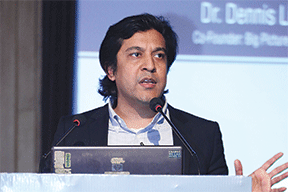 An alumnus of the Harvard Graduate School of Education and promoter-director of the Heritage Group of schools in Delhi NCR, Manit Jain has successfully mainstreamed experiential learning pedagogies in the group’s three schools with an aggregate enrolment of 6,000 students and 600 teachers. Over a period of ten years, Heritage schools have transformed into activity hubs where students and teachers learn-teach through hands-on experiences and real-life projects.
An alumnus of the Harvard Graduate School of Education and promoter-director of the Heritage Group of schools in Delhi NCR, Manit Jain has successfully mainstreamed experiential learning pedagogies in the group’s three schools with an aggregate enrolment of 6,000 students and 600 teachers. Over a period of ten years, Heritage schools have transformed into activity hubs where students and teachers learn-teach through hands-on experiences and real-life projects.
Why the sharp focus on experiential learning?
There’s widespread — and justified — dissatisfaction with India’s traditional system of rote learning. There’s too much emphasis on examination success — the flag bearer of the rote system. In the meanwhile, skill-sets required for success in industry, governance and social interaction have changed drastically.
How has experiential learning been integrated into the curriculum of Heritage schools?
Experiential learning is about getting students involved in real projects and experiences, and helping them discover the connection between theory and practice. In our schools, from kindergarten to class XII, teaching-learning is through projects and hands-on learning with teachers taking students through the experiential learning cycle of project implementation, reflection, dialogue and comprehension. For instance in junior school, children go through at least 40 ‘experiences’ of four-six weeks duration in which they learn and understand concepts through inquiry and exploration. Moreover, all students are actively engaged in the Green School project which has resulted in reduction of water consumption by almost 150,000 litres per day in Heritage, Gurgaon.
Future plans.
Currently, we are focused on promoting a pre-service teacher education institute named ‘I am a Teacher’ in which we are attempting to develop a model of experiential learning for teacher training. This one-year practice-based postgraduate diploma programme is set to admit its first batch in June.
Films-in-lessons ideator
A physics and film production postgraduate of Delhi University and Xavier Institute of Communications, Mumbai, amateur documentary film-maker Subha Das Mollick is associate director at the Institute of Leadership, Entrepreneurship & Development (iLEAD), Kolkata. Mollick is also founder-secretary of Bichitra Pathshala, an NGO promoting teaching-learning through moving images, i.e. film. 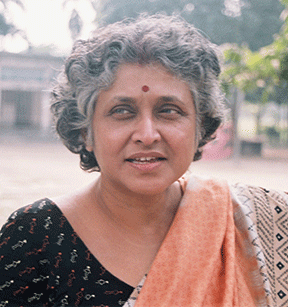
What was the inspiration and motivation behind Bichitra Pathshala?
In the past ten years, there have been major efforts to integrate ICT in primary, secondary and higher education. We felt films and documentaries could also be effectively used to make classroom teaching more interesting and enjoyable for students. In 2010, under the aegis of Chitrabani, one of the oldest media libraries in eastern India with a collection of over 1,000 films from world over, we began conducting integration workshops for school teachers and students. Two years later, in 2012, we registered Bichitra Pathshala.
What’s the modus operandi of Bichitra Pathshala?
Our objective is to make learning joyful through the use of moving images and secondly, to make teachers and students discerning consumers of the film medium. We use clips from popular films, documentaries, YouTube videos, news and television programmes, and integrate them into lesson plans to illustrate and explain academic subjects. Our first big workshop in Kolkata ‘Tools in Schools’, funded by the Children’s Film Society of India, attracted more than 50 teachers. This year, we have introduced a lesson plan competition ‘Learning with Moving Images’ for teachers and trainee teachers.
Reach and impact.
Since 2010, we have conducted more than 25 workshops for school teachers in Kolkata.
Future plans. We want to turn ‘Learning with Moving Images’ into an annual event, and create a bank of lesson plans for teachers.
Science learning facilitator
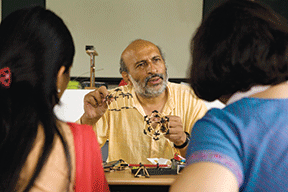 Former coordinator of the Children’s Science Centre (CSC) at the Inter-University Centre for Astronomy and Astrophysics, Pune, Arvind Gupta has popularised activity-based science education for thousands of children in Pune by incorporating scientific principles to make simple, low-cost toys. During his ten-year tenure (2004-14) at CSC, where he continues to conduct twice-weekly workshops, Gupta has taught students from over 2,000 schools to produce fun toys from waste materials. An engineering graduate of IIT-Kanpur and former science consultant with NCERT and Unesco, Gupta has also produced over 5,600 videos which demonstrate how to make toys employing scientific principles.
Former coordinator of the Children’s Science Centre (CSC) at the Inter-University Centre for Astronomy and Astrophysics, Pune, Arvind Gupta has popularised activity-based science education for thousands of children in Pune by incorporating scientific principles to make simple, low-cost toys. During his ten-year tenure (2004-14) at CSC, where he continues to conduct twice-weekly workshops, Gupta has taught students from over 2,000 schools to produce fun toys from waste materials. An engineering graduate of IIT-Kanpur and former science consultant with NCERT and Unesco, Gupta has also produced over 5,600 videos which demonstrate how to make toys employing scientific principles.
What prompted the switch from engineering to popularising science through toys production?
I developed an interest in education, while teaching underprivileged children as a student at IIT-K. Later I got a chance to work with the Hoshangabad Science Teaching Programme in Madhya Pradesh where I taught children to make simple toys using locally available materials and trash items. This was very fulfilling because the poorest children could use waste items to make toys and learn science simultaneously. In most schools, science pedagogy is so dull that students have begun to hate this beautiful subject.
The Children’s Science Centre
CSC is supported by a recurring three-year Rs.60 lakh grant from the Sir Ratan Tata Trust. The centre’s objective is to popularise science and ideate innovative pedagogies to teach this subject to children. Over the past ten years we’ve learned that making toys out of discarded materials is an excellent way to teach science subjects to first generation learners without learning support at home and studying in poorly-equipped schools. CSC has proved that teaching/learning science doesn’t require expensive laboratories.
Reach and impact. The centre has conducted workshops for children from 600 schools in Maharashtra.
My website www.arvindguptatoys.com, launched in 2010, features short videos (Toys from Trash) in 18 languages and over 5,500 books on science, math, environment, etc. Every day 40,000 children round the world view our videos.
What are your future plans?
Over the years, I have translated 170 English language science textbooks into Hindi and would like to translate many other interesting books for children into Hindi. I intend to continue working with CSC to make science a student-friendly subject.
Early childhood education pioneer
Lina Ashar is the founder-director of Kangaroo Kids Education Ltd (KKEL), Mumbai. Educated in Africa, UK and Australia and an education alumna of the Victoria College, Melbourne, Ashar promoted the first Kangaroo Kids preschool in Bandra, Mumbai in 1993. Since then, the KKEL-owned and franchised chain of Kangaroo Kids & Billabong High International schools has grown to over 100 in 28 cities across India and abroad.
What was the motivation for promoting Kangaroo Kids?
Back in the 1990s, professionally administered early childhood care and education (ECCE) was almost unknown in India. I was keen to provide joyful and child-centred ECCE to youngest children to build them a strong foundation to become thinkers, innovators, and problem solvers of the future.
What are Kangaroo Kids’ pedagogy and other innovations?
Kangaroo Kids was the first in Indian education to introduce child-centric pedagogy in ECCE. We were also the first to establish a dedicated in-house R&D team to provide well-researched ECCE curriculums and pioneer a teacher-parent partnership model.
Reach and impact.
KKEL comprises 100+ schools with an enrolment of 15,000 students in India, the Middle East and South Asia.
Your future plans?
Our focus will be on expanding our reach in India and overseas, and designing a K-12 digital education model.
Democracy education innovator
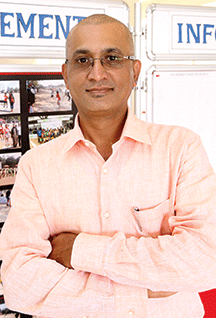 An alumnus of Bangalore and Dortmund (Germany) universities and former director of the Public Affairs Centre, Bangalore, Dr. Manjunath Sadashiva is co-founder and director of the Children’s Movement for Civic Awareness (CMCA). Established in 2000, CMCA’s mission is to promote democratic citizenship education among India’s children and youth.
An alumnus of Bangalore and Dortmund (Germany) universities and former director of the Public Affairs Centre, Bangalore, Dr. Manjunath Sadashiva is co-founder and director of the Children’s Movement for Civic Awareness (CMCA). Established in 2000, CMCA’s mission is to promote democratic citizenship education among India’s children and youth.
What is the history and motivation behind promotion of CMCA?
CMCA was conceived in the new millennium year in a context when prospects for evolution of a humane and egalitarian democracy in India looked bleaker than ever before in an increasingly disturbing socio-political landscape characterised by widening inequalities, threats to fundamental rights, lack of transparency and accountability in public institutions. Moreover there is abject disregard for rule of law compounded by young citizens’ apathy and ignorance of their role in a democracy.
What are the chief objectives and modus operandi of CMCA?
To directly engage and empower children and youth with relevant knowledge, life skills and competencies for active citizenship through an experiential learning process. To this end, we have initiated a Civic Club Programme as a co-curricular intervention for secondary school students, delivered by passionate and well-trained community volunteers, and a Campus Nagarik Life Skills programme for college undergraduates.
We also continuously advocate policy reforms to energise and democratise citizenship education in schools, colleges and universities, and reform of co-curricular programmes such as NCC, NSS, Eco Clubs, Consumer Clubs and so on to transform into democracy education organisations.
How satisfied are you with the progress of CMCA?
CMCA has not only transitioned from cities to villages but also from schools to colleges. CMCA is active in 300 schools in nine cities viz. Bangalore, Mumbai, Trivandrum, Pune, Nagpur, Guwahati, Mysore, Hosur and Hubli-Dharwad, and 30 villages in four districts of Karnataka. We reach out to 17,000 adolescents and youth annually.
Future plans.
Developing robust metrics for disseminating CMCA impact and success stories, intensifying policy research and advocacy of democracy education practices countrywide, establishing Civic Club programmes in rural and urban India, and a fully-equipped National Resource Centre on Democratic Citizenship.
Skilling evangelist
Pune-based Sunanda Mane is co-founder and president of Lend-a-Hand-India (LAHI), an NGO with offices in Pune, London and New York. LAHI provides vocational education, life skills programmes and career counseling advice to secondary school students in rural India. An alumna of Pune and Columbia (New York) universities with over two decades experience in the development sector (UNDP, CARE, World Bank), Mane co-founded LAHI (annual budget: Rs.3 crore) with Raj Gilda in 2003, to help students in neglected secondary schools of rural India bridge the huge gap between the education they are provided and skills required in the workplace.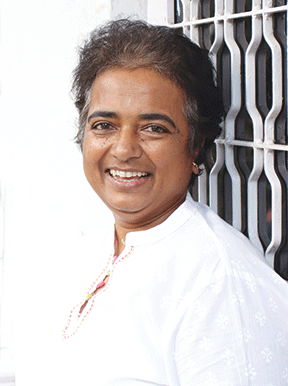
What is the motivation and objective of LAHI?
India is either poised to reap the benefits of its demographic dividend or pay the high social cost of hosting millions of youth ill-equipped to join the labour force. One of the critical factors behind this phenomenon is the significant disconnect between school curriculums and skills needed in the jobs market. In addition to a huge deficit of vocational and technical training in secondary schools, rote learning, limited behavioural/life skills, and poverty of analytical and problem solving skills have created a vast pool of unemployable youth. LAHI was promoted 12 years ago to address this problem.
LAHI’s major programmes.
LAHI works at the intersection of education and livelihood to prepare youth for employment and self-employment. We provide teenagers training in 20 skills such as poultry farming, motorcar repair, fabrication, carpentry, basic electrical engineering, tailoring, construction, etc. Moreover, our career counsellors provide aptitude testing, individual/group advice and run year-long capacity building workshops. We also offer bridge loans to promising school-leavers to start micro-enterprises.
LAHI’s impact. Our jobs preparation and life skills programme covers 15,000 boys and girls in rural secondaries in five states — Maharashtra, Karnataka, Goa, Gujarat and Uttar Pradesh. Some other programmes reach another 2,000 youth.
Future plans. Vocationalisation of secondary education is now a major policy thrust of the Central and state governments. LAHI will continue to encourage and collaborate with government to enable access to vocational education to young people living in neglected communities.
Youth development activists
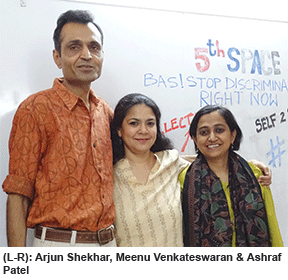 Alumni of Delhi University, XLRI, Jamshedpur and IIM-Bangalore, Ashraf Patel, Arjun Shekhar and Meenu Venkateswaran are co-founders of Delhi-based NGO Pravah (estb. 1993), preparing adolescents and youth for citizenship and societal responsibility. Over the past two decades, the trio has designed and implemented programmes to sensitise over 150,000 adolescents and college youth to social problems, encouraging them to volunteer in community service projects and transform into agents of social change.
Alumni of Delhi University, XLRI, Jamshedpur and IIM-Bangalore, Ashraf Patel, Arjun Shekhar and Meenu Venkateswaran are co-founders of Delhi-based NGO Pravah (estb. 1993), preparing adolescents and youth for citizenship and societal responsibility. Over the past two decades, the trio has designed and implemented programmes to sensitise over 150,000 adolescents and college youth to social problems, encouraging them to volunteer in community service projects and transform into agents of social change.
What is the inspiration behind Pravah?
In 1992 when the Babri Masjid was demolished by fundamentalists, we realised that the great majority of people were apathetic to such issues. We shared the belief that we need to take preventive rather than curative approaches to social conflicts. By investing in future decision makers in politics, government, media and business, we believe it is possible to develop socially responsible youth. Thus Pravah was born with some of us quitting our corporate careers.
How satisfied are you with Pravah’s progress?
We have created very exciting curriculums, programmes and learning journeys to develop young people into responsible and socially aware citizens. They include ‘From Me to We’, a 40-100 hour curriculum for adolescents between 13-17 years focusing on self-awareness, team work and social exposure through field visits to rural areas; Prayasapna, a programme which helps to socially empower 1,850 teen clubs established in rural areas by the Nehru Yuva Kendra Sangathan in partnership with United Nations Population Fund; and SMILE, an initiative which develops conflict-resolution skills, promotes social cohesion and involves college students in social action projects. Our programmes reach 8,000 adolescents and youth countrywide.
Future plans.
We want to mainstream our efforts. To this end, we have incubated a collective — ComMutiny the Youth Collective — of 40 youth and youth-led organisations in 12 states and we’re currently engaged with 200 young leaders and social entrepreneurs. Through the collective, we want to build a consortium of partners ready and willing to invest in holistic education of youth.
Social innovation labs inventor
Pradeep Ghosh is founder-president of the Bhopal-based OASiS Foundation (estb.2003), established to “develop innovative, simple, practical and easily replicable solutions for the social sector”. An alumnus of Barkatullah Vishwavidyalaya, Bhopal and Ashoka Fellow, Ghosh has spearheaded the development of seven social innovations including the Museum School.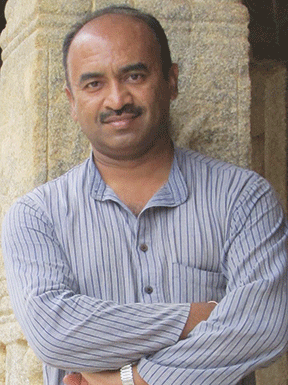
What was the motivation behind the promotion of OASiS?
We found that unlike industry and academia which have research labs to innovate products and processes, social sector institutions were deprived of this facility with research being limited to surveys, analyses and reports. OASiS was started to establish social innovation labs to encourage research, innovation and experimentation in education, health and other social sectors.
What are OASiS’ major innovations?
OASiS’ programmes are designed using our IRIPS — identify, research, innovate, plot, share — process. Since 2003, we have developed seven projects using the IRIPS process — a social innovation lab for university students, a social security system, the Museum School, Nirmaya (insurance for the disabled), Social Welfare Association of Neo Socialites, a social credit system and Gramodaya, a rural education model.
The Museum School is our quality education model for underprivileged urban children. It uses State-run museums as centres of learning with cultural and historical exhibits serving as teaching aids. Underprivileged children are bussed to museums where trainee teachers of B.Ed colleges teach them through the exhibits. The Museum School was conferred the Kubera-Edelweiss Social Innovation Award in 2009.
The objective of the social innovation lab project is to provide university students opportunities to design, test and implement social and environmental solutions.
Reach and impact.
The Museum School has benefited over 1,200 children in four cities: Bhopal, Bangalore, Mumbai and Delhi. The social innovation lab concept has already been adopted by McMaster University, Canada, and is being established in three colleges and deemed universities in India.
Future plans.
We hope to influence policy to make social innovation labs compulsory in higher education institutions and Museum Schools mandatory for all museums countrywide.
Digital content disseminator
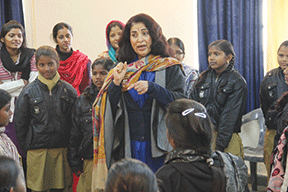 A social entrepreneur and educationist for 29 years, Urvashi Sahni is founder of the Study Hall Educational Foundation which runs a CBSE-affiliated K-12 school (Study Hall) in Lucknow, a rural school (Vidyasthali) which serves 472 students from 55 villages, and the all-girls Prerna with an enrolment of 730 girls from urban slums. An alumna of Pune and Lucknow universities with a Ph D from UC Berkeley, Sahni launched Digital Study Hall (DSH) in 2005.
A social entrepreneur and educationist for 29 years, Urvashi Sahni is founder of the Study Hall Educational Foundation which runs a CBSE-affiliated K-12 school (Study Hall) in Lucknow, a rural school (Vidyasthali) which serves 472 students from 55 villages, and the all-girls Prerna with an enrolment of 730 girls from urban slums. An alumna of Pune and Lucknow universities with a Ph D from UC Berkeley, Sahni launched Digital Study Hall (DSH) in 2005.
What is the motivation behind DSH?
A chronic shortage of qualified teachers in rural and slum schools is the most challenging problem faced by India’s over-burdened education system. It’s not unusual for a government village school with 200-500 students to have fewer than half a dozen teachers, and even they tend to be under-qualified. Nor is it unusual for teachers to be absent or abandon classes without any notice. Contemporary ICT can reach remote, resource-starved schools, and enable teachers to teach better and students to improve their learning outcomes independently.
What are the objectives of DSH?
To provide high-quality recorded video lessons to poor rural and slum schools. We digitally record live classes of best teachers, gather them in a large database, and distribute them to poor rural and slum schools by way of DVDs, web and media content. Teachers ‘mediate’ these digital lessons, often pausing to replicate the activities shown. This helps local teachers who aren’t adequately trained, to deliver quality education to underprivileged children. Academic subjects apart, we also provide digital content on women’s empowerment, child marriage, sexual abuse etc.
How satisfied are you with the reach and impact of DSH?
We are currently working with District Institutions of Education and Training in 70 districts of Uttar Pradesh, run 12 non-formal education centres with 400 students, and intervention programmes in 100 Kasturba Gandhi Balika Vidyalayas (girls schools). Our digital content is being used by 20,000 teachers and students in Uttar Pradesh, West Bengal, Maharashtra and Karnataka.
Future plans.
To explore the potential and applications of mobile phones and other media for content transmission
Committed technologies integrator
Jesus Lall is chairman and CEO of the Mumbai-based Universal Education Group comprising over 50 schools and higher education institutes in India with an aggregate enrolment of 35,000 students. Under his guidance, the Universal group of 25 schools has attained leadership status in integrating technology into teaching-learning. A pioneer in introducing Apple iPods in kindergarten and iPads in primary education, Lall has blended new ICT (information communication technology) into curriculums to deliver joyful, engaging and interactive educational experiences to K-12 students.
What is the motivation behind introduction of Apple iPods, iPads, etc in Universal schools?
The 21st century will be defined by skills-based learning rather than knowledge gathering. Providing students opportunities to connect with the rest of the world is crucial as we prepare them for a modern globalised economy. Today’s children are becoming tech-savvy very early in life. Integrating technology helps to make learning enjoyable and engaging for them.
Moreover, new technology — readable electronic texts, voice synthesizers, videotaped classes — are very useful for educating physically challenged children.
Universal’s technology initiatives.
At Universal, technology is woven into the fabric of the teaching-learning process. Our partnerships with tech powerhouses such as Apple, Google and Espresso allow us to fully integrate technology into curriculums.
For instance, the Universal School, Tardeo is a 1:1 Apple school with age-appropriate Apple devices — iPods for preschool, iPads for primary and MacAirs for middle and secondary school — provided to every student and teacher. Universal’s partnership with Espresso, the UK’s #1 digital curriculum service, enables transmission of high-quality, cross-curricular and video-rich digital resources to students’ computers and LCD displays in each classroom.
Reach and impact. Our technology initiatives cover all our 15,000 school students and 1,200 teachers.
Future plans. We plan to extend the use of multipurpose electronic identity cards to all students in a phased manner and provide tablets loaded with intelligent, adaptive curriculums offering anywhere, anytime learning.
Improved outcomes missionary
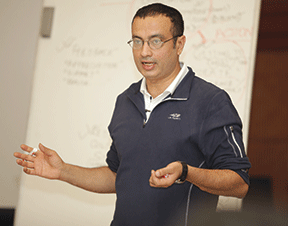 Ashish Rajpal is founder-managing director of XSEED Education, which offers its XSEED programme — a K-class VIII curriculum with detailed lesson plans and tools to assess children’s learning outcomes — to over 1,600 schools across the country. An alumnus of XLRI, Jamshedpur and the Harvard Graduate School of Education, in 2001 Rajpal forsook a promising career with the Paris-based Groupe Danone, to return to India and promote XSEED.
Ashish Rajpal is founder-managing director of XSEED Education, which offers its XSEED programme — a K-class VIII curriculum with detailed lesson plans and tools to assess children’s learning outcomes — to over 1,600 schools across the country. An alumnus of XLRI, Jamshedpur and the Harvard Graduate School of Education, in 2001 Rajpal forsook a promising career with the Paris-based Groupe Danone, to return to India and promote XSEED.
What is the motivation behind XSEED Education?
The problem of quality in education prompted the birth of XSEED. School visits and research evidence forced us to confront the brutal reality that a majority of students leave school without sufficient grasp of core concepts and the ability to apply knowledge to real-life situations. While teachers are often blamed, investments in stand-alone teacher training academies or piecemeal investment of supplementary resources, have limited impact on classroom practice. XSEED is the answer.
XSEED objectives and innovations.
The core promise of XSEED is to measurably improve learning outcomes in elementary schools while working within the constraints of state-mandated syllabi, ill-trained teachers and inadequate infrastructure. The innovation of XSEED is that we provide schools with practical toolkits which include detailed lesson plans for teachers, applications-oriented student learning resources and on-going skills assessment backed by year-round professional development programmes.
Reach and impact.
XSEED reaches 800,000 children and 50,000 teachers in over 1,600 schools in India and abroad. Our internal assessment shows up to 20 percent improvement in student learning outcomes after usage of the XSEED programme.
What are your future plans?
The future of XSEED is to individualise learning for every child by utilising new information communication technologies. We will also go beyond India, especially to developing countries where the demand for quality education is growing.
Activity-based learning pioneer
A top-level bureaucrat who served in various departments of the Tamil Nadu state government for over 33 years, Dr. M.P. Vijayakumar is widely acknowledged as the moving force behind the introduction and implementation of the revolutionary activity-based learning (ABL) model in Tamil Nadu’s government primaries. After his retirement in 2011, Vijayakumar has been nominated to serve on several government committees including the National Resource Group of NCERT and Navodaya Vidyalaya Samiti, and is actively involved with the introduction of ABL in primary schools countrywide.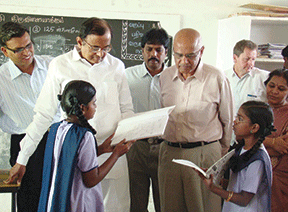
What is the inspiration and history of ABL?
As collector of Vellore district (1993-1996) and in charge of child labour eradication and education, together with some of my colleagues we explored alternative child-friendly pedagogies. We were impressed with the ABL model designed by the Rishi Valley Rural Education Centre in Andhra Pradesh. I adapted ABL and set up non-formal schools for children working as bonded labour in Vellore. Later, in 2006 when I took charge as state project director of Sarva Shiksha Abhiyan, I persuaded the then DMK government to implement ABL in all of the state’s 37,486 government primaries.
What are the distinguishing features of the ABL model?
ABL is a child-centric pedagogy which mixes children aged five-nine years in classrooms to encourage activities-led peer-to-peer learning, and self-study using activity cards and worksheets with teachers discharging the role of facilitators rather than instructors. There are no exams, but evaluation is inbuilt with teachers constantly assessing each child’s progress. No student can move to the next level without attaining competency in the previous level.
Reach and impact.
ABL is now being implemented in all 37,486 government primary schools of Tamil Nadu. Studies conducted by SchoolScape and NCERT have confirmed remarkable improvements in learning outcomes of children.
Future plans.
Education administrators and academics from several states and countries have approached me to train their teachers in ABL pedagogy. I am also planning to apply the active learning model in a private engineering college in Erode district.
With Paromita Sengupta, Balasubramaniam K (Bangalore); Shweta Nair (Mumbai); Baishali Mukherjee (Kolkata) & Puja Awasthi (Lucknow)
Also read: 50 Leaders Changing Indian Education


























